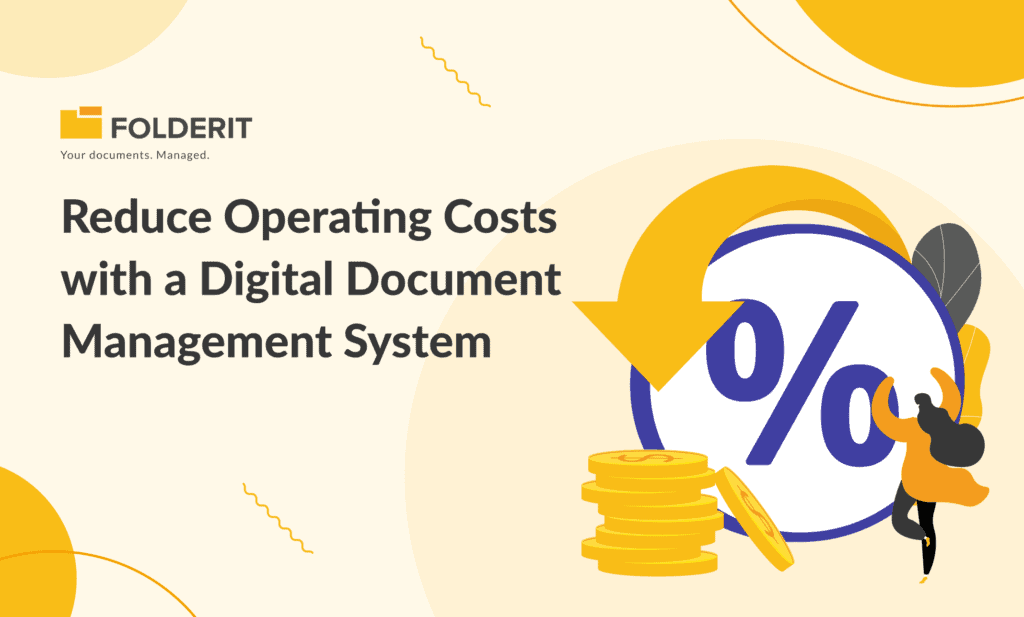Organizations are constantly seeking strategies to streamline operations and reduce costs. One transformative solution that has emerged is the adoption of a Digital Document Management System (DMS). This innovative approach not only propels businesses towards digital transformation but also significantly lowers operating expenses (OPEX) across all departments.
The Economic Imperative of Going Paperless
The shift towards a paperless office is more than an environmental statement; it's a strategic economic decision. Traditional paper-based processes are not only cumbersome and time-consuming but also incur substantial costs related to printing, filing, and storing documents.
A DMS revolutionizes this scenario by digitizing documents, thereby eliminating the need for physical storage and reducing reliance on paper, ink, and related supplies. The immediate impact is a drastic reduction in direct costs. However, the benefits extend beyond mere savings on materials to encompass enhanced efficiency in document handling and retrieval. Digital documents can be accessed and shared instantly, streamlining workflows and significantly reducing the time employees spend on document-related tasks.
Automating Business Processes for Cost Containment
The automation capabilities of a DMS extend its value beyond simple document storage. By automating workflows, particularly in critical areas such as accounting, sales, customer service, and HR, a DMS facilitates faster transaction processing, enhances customer satisfaction, and improves employee retention.
For instance, automated invoice processing accelerates payment cycles, enabling businesses to capitalize on early payment discounts and avoid late fees. Similarly, digital onboarding processes reduce HR expenses by streamlining employee integration and training.
Improving Staff Productivity
One of the most significant advantages of a DMS is its ability to free up staff time from mundane, repetitive tasks. Automated document routing, approval workflows, and instant access to information allow employees to focus on higher-value activities that contribute to business growth.
This shift not only boosts staff morale by reducing frustration associated with inefficient processes but also increases overall business productivity. The ability to monitor and manage business processes in real-time further empowers managers to make informed decisions, optimizing operations and reducing costs.
Enhancing Financial Management and Oversight
A DMS offers unparalleled visibility into financial operations, from tracking expenses in the accounts payable department to managing travel expenditures. Digitalization streamlines the payment process, ensuring timely transactions and improving cash flow management.
Moreover, automating expense reporting and monitoring provides a comprehensive overview of spending, highlighting areas for potential savings and improving budget accuracy.
Optimizing Resource Allocation
A pivotal benefit of deploying a DMS is the optimization of resource allocation. By automating routine tasks, organizations can redirect their human and financial resources towards areas that drive growth and innovation.
This strategic reallocation not only boosts productivity but also enhances the organization's ability to respond to market changes swiftly and effectively. A DMS ensures that resources are utilized in the most impactful manner, contributing to the overall health and scalability of the business.
Strengthening Disaster Recovery and Business Continuity
A DMS plays a crucial role in strengthening disaster recovery and business continuity plans. Digital document storage, coupled with robust backup and recovery solutions, ensures that critical business documents are protected against data loss due to disasters, cyberattacks, or technical failures. This resilience is essential for maintaining operational continuity and safeguarding against potential disruptions that could impact the business's financial health and reputation.
Driving Sustainable Business Practices
The environmental benefits of a DMS align with the growing emphasis on sustainability in business practices. By reducing paper use and waste, organizations contribute to environmental conservation efforts, meeting corporate social responsibility goals and appealing to eco-conscious consumers and stakeholders.
This commitment to sustainability can enhance the company's brand image and support long-term success in an increasingly environmentally aware market.
Conclusion
The adoption of a Digital Document Management System is more than a strategic move to reduce operating costs; it's a commitment to embracing digital transformation and fostering a forward-thinking organizational culture. A DMS not only streamlines document management processes but also serves as a catalyst for innovation, efficiency, and resilience.
As businesses navigate the complexities of the digital age, the comprehensive benefits of a DMS—from operational efficiencies and cost savings to enhanced data analytics, disaster recovery, and sustainability—underscore its value as an indispensable asset for achieving long-term strategic objectives and maintaining a competitive edge in the marketplace.



